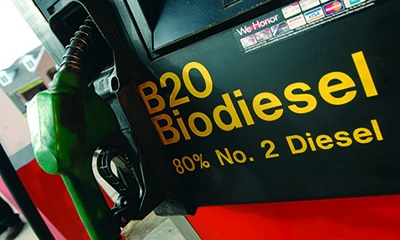April 14, 2016

Sponsored Content
As the second largest producer of biodiesel in the nation - producing nearly 200 million gallons of biodiesel in eight production facilities - Missouri is well positioned to make a significant difference in with the renewable fuel. Agricultural organizations have long-touted farmers’ reductions in energy and water usage, and biodiesel takes those sustainability efforts a few steps further.
 Biodiesel is a sustainable choice, offering many environmental benefits and providing a price support for soybeans.
Biodiesel is a sustainable choice, offering many environmental benefits and providing a price support for soybeans.
“Biodiesel is a green, renewable product providing overall cleaner air and cleaner manufacturing,” says Robert Alpers, board member of the Missouri Soybean Merchandising Council, which supported early biodiesel research through the soybean checkoff. “The Merchandising Council, along with soybean growers across the state, continue to support the biodiesel industry because it makes for a better environment to raise our families.”
The Missouri Department of Transportation’s (MoDOT) strongly advocates for the use of renewable fuels. MoDOT is encouraged to fuel 75 percent of fleet vehicles and other heavy equipment with a biodiesel blend of B20 or higher. Biodiesel is also used in support vehicles at the St. Louis airport, in some of Kansas City’s municipal vehicles, and is sold at Love’s Travel Stops across the state. Add that to the more than 2500 jobs supported by biodiesel and the more than $1.7 billion value-added benefit to Missouri’s GDP, and there’s no doubt that there’s a bright future for biodiesel.
Seeing that bright future is for biodiesel is even easier because biodiesel’s lower emissions remove the equivalent of 2 million passenger cars from Missouri’s roads in one year of average driving. In comparison to petroleum diesel, biodiesel reduces carbon dioxide by 78 percent, produces 86 percent fewer lifecycle greenhouse gases, creates 47 percent less particulate matter, and decreases hydrocarbon emissions by 67 percent.
Biodiesel provides multiple benefits to human health. Chapters of the American Lung Association continuously pledge their support of the biodiesel industry. The American Lung Association of the Upper Midwest (ALAUM) goes as far as using the tagline, “If you can’t breathe, nothing else matters.” ALAUM promotes biodiesel as a Clean Air Choice due to its ability to reduce exposure to air pollutants.
Beyond the environmental benefits, biodiesel production offers financial stability. Farmers realize benefits through biodiesel as production adds value to soybean oil and through support for next generation renewable biofuels as a result of various federal and various state initiatives. Soybean farmers, as well as livestock farmers benefit from biodiesel as the fuel adds significant value to the soybean supply chain.
In a time when soybean prices are down and look to stay low for the foreseeable future, protecting the bottom line becomes ever more important. The price support biodiesel provides for commodity beans is key. Recent research from the Federal Reserve System found a relationship between biodiesel production and soybean prices suggesting that biofuels increased the price for commodity beans by more than 15 percent. A separate study done by Centrec Consulting Group, LLC also saw biodiesel production as providing price support for soybeans.
The next hurdle for biodiesel in Missouri is distribution to the consumer’s personal vehicle. While a national leader in production, much of Missouri’s biodiesel is currently being hauled out of state – rather than being made available to consumers locally. Currently, fewer than 30 fuel stations across Missouri offer biodiesel blends.
The Missouri Soybean Merchandising Council is working to change that. The lack of infrastructure is limiting the industry’s ability to elevate the entire soybean value chain. To help with these limitations, Missouri Soybean Association and Merchandising Council Executive Director, Gary Wheeler, is asking for voices.
“Without the voices of consumers asking for clean, local, renewable biodiesel,
it’s going to be a slow process to see our soy-based fuel become widely available across our state,” Wheeler said. “The simple request, asking your local filling station or co-op to carry biodiesel, will help us continue to grow Missouri’s biodiesel infrastructure.”
To learn more about biodiesel in Missouri, visit www.mosoy.org.
You May Also Like




